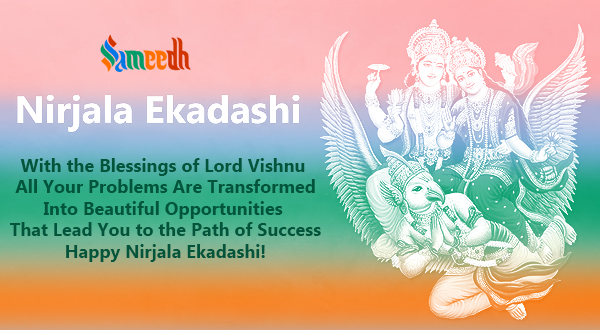The word “Nirjala” translates to “without water” in Hindi, and this Ekadashi is characterized by a strict fasting practice that involves abstaining from both food and water. It is considered the most austere and difficult Ekadashi observance.

In Sanskrit, Ekadashi means eleven. According to the Hindu calendar, Ekadashi is the eleventh day of the two lunar cycles of the moon, after a new and full moon. On this auspicious day, the devotees of the Hindu god of preservation, Vishnu, go on a fast, offer prayers and chant mantras of praises. It is celebrated as a propitious day in Jainism too.
Nirjala Ekadashi
Nirjala Ekadashi is a significant event in Hinduism and is observed on the eleventh day (Ekadashi) of the bright fortnight (Shukla Paksha) in the Hindu lunar month of Jyeshtha. This day holds great religious and spiritual importance among devotees, particularly followers of Lord Vishnu.
The word “Nirjala” translates to “without water” in Hindi, and this Ekadashi is characterized by a strict fasting practice that involves abstaining from both food and water. It is considered the most austere and difficult Ekadashi observance.
Devotees who observe Nirjala Ekadashi undertake a rigorous fast throughout the day and night without consuming any food or water. The fasting is believed to be as meritorious as observing all the other Ekadashis of the year. It is believed that by observing this fast, one can obtain the benefits of all the other Ekadashi fasts.
Story behind Nirjala Ekadashi
The story behind Nirjala Ekadashi is associated with Bhim, one of the Pandav brothers from the Hindu epic Mahabharat. According to the legend, Bhim was known for his immense appetite and his inability to observe regular Ekadashi fasts, which involved abstaining from food on the eleventh day of the lunar fortnight.
Bhim approached the sage Vyas, seeking guidance on how he could observe Ekadashi and receive its blessings despite his voracious hunger. Understanding Bhima’s predicament, Sage Vyas advised him to observe a special Ekadashi known as Nirjala Ekadashi.
Sage Vyas explained to Bhim that Nirjala Ekadashi was an Ekadashi fast observed without consuming any food or water. Bhim, being a devoted follower of Lord Vishnu, decided to undertake this rigorous fast.
On the day of Nirjala Ekadashi, while all the other Pandav’s and people were observing regular Ekadashi fasting, Bhim remained steadfast without eating or drinking anything. He endured the hunger and thirst throughout the day and night, offering prayers to Lord Vishnu.
Impressed by Bhim’s unwavering devotion and dedication, Lord Vishnu appeared before him. Pleased with Bhim’s commitment and sacrifice, Lord Vishnu granted him immense blessings, including forgiveness for any past sins and the fulfillment of his wishes.
The story of Bhim’s observance of Nirjala Ekadashi became popular, and it is believed that by observing this fast, one can obtain the benefits of all the other Ekadashi fasts throughout the year. Therefore, Nirjala Ekadashi is considered the most auspicious and significant Ekadashi among all the Ekadashis observed in Hinduism.
Significance of Nirjala Ekadashi
Nirjala Ekadashi holds great significance in Hinduism due to its unique observance and the spiritual benefits associated with it. Here are the key aspects of the significance of Nirjala Ekadashi:
- Austerities and Devotion: Nirjala Ekadashi is known for its rigorous fasting practice. Unlike other Ekadashis where only food is avoided, devotees observing Nirjala Ekadashi abstain from both food and water for the entire day and night. This intense austerity showcases the devotee’s dedication, self-discipline, and unwavering devotion to Lord Vishnu.
- Equivalent to all Ekadashis: It is believed that by observing Nirjala Ekadashi, one can obtain the benefits of all the other Ekadashi fasts observed throughout the year. This makes Nirjala Ekadashi highly meritorious and significant. It is considered a shortcut or an all-in-one approach to gaining the spiritual rewards associated with the other Ekadashis.
- Spiritual Cleansing and Purification: Observing Nirjala Ekadashi is believed to purify the mind, body, and soul. Fasting without water for an entire day is seen as a way to cleanse oneself of impurities, sins, and negative energies. It is an opportunity for devotees to reset their spiritual journey, seek forgiveness, and attain spiritual growth.
- Boons and Blessings: It is believed that by observing Nirjala Ekadashi with sincerity and devotion, devotees can receive abundant blessings from Lord Vishnu. These blessings may include the forgiveness of sins, the fulfillment of desires, and overall well-being. Devotees pray for spiritual enlightenment, liberation (Moksha), and the grace of Lord Vishnu.
- Testing Devotional Strength: Nirjala Ekadashi is considered one of the most challenging Ekadashis due to the strict fasting without water. It tests the physical and mental strength of devotees. By successfully observing this austerity, devotees demonstrate their dedication, willpower, and commitment to their faith.
- Vrat and Ritual Observance: On Nirjala Ekadashi, devotees engage in various religious rituals and practices. They visit temples dedicated to Lord Vishnu, offer prayers, recite hymns and scriptures, and participate in spiritual discourses. The day is spent in deep devotion, introspection, and seeking the divine blessings of Lord Vishnu.
Nirjala Ekadashi holds a special place in Hinduism as it combines the spiritual significance of Ekadashi fasting with the element of extreme austerity through fasting without water. It is an opportunity for devotees to deepen their devotion, seek spiritual growth, and gain the blessings of Lord Vishnu.
Overall, Nirjala Ekadashi holds great significance in Hinduism, as it combines the spiritual observance of Ekadashi with the element of austerity and self-discipline through fasting without water.